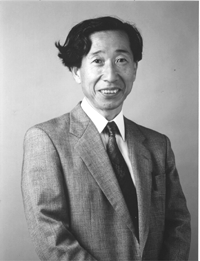
Shun-ichi Amari
ProfessorDepartment of Mathmathical Engineering and Information Physics
Faculty of Engineering
University of Tokyo

|
Shun-ichi AmariProfessorDepartment of Mathmathical Engineering and Information Physics Faculty of Engineering University of Tokyo |
From old times, people have not only been daunted by the mechanisms of nature, but also have embraced particular interest in them. When utilized the mechanisms and applied gadgets to them, things worked well unexpectedly. This would have been the beginning of technology and of science. Having progressed civilizations, there appeared people who devoted themselves in such areas along with entering the age of the machine civilization. They were scientists and technical experts. These researchers lived as lone wolves and were also gamblers who made their own ideas and abilities known to the world. However, as science and technology have highly developed, researches have become remarkably organized as well. Today, science has turned monstrous and grew as projects affecting national prestige, and technology is said to be the key for desperate struggles that companies fight for their great strides and survival. Under such circumstances, researchers are now questioned as to their presence.
Up to now, we have been told that the Japanese were good at making steady technical developments through organized research activities to jump out to the forefront of technology. Such characteristic has led to the originality deficiency, thus we also were described, but I disagree with it. Tracing back to the past, as you will realize with "gimmick" things in the Edo period, we should have liked contrivance and invention, and to conceive original ideas deliberately. Nevertheless, it just might have not been able to be displayed to the full extent in the technology and development system designed to catch up and pass another. Lagging behind in the field of the information science and the software development explains this graphically.
Seeking technology that will learn from and live together with human beings, the RWC Program has started with a research system that goes beyond existing frameworks. Researchers are given the stage here where they can decisively display their skill, including to keep building up targets self-organizingly fixing none for ten years ahead. Yet, giving the place does not necessarily allow substance to come appear automatically. This is the very place where the originality, the thought and the ability to take action of researchers are going to be tested. It will be embarrassing if researchers become dizzy and lose direction on the unencumbered ground.
To let each individual researcher exhibit their originality successfully, we should have the conceptualizing skill and leadership of superior leaders and, moreover, "conviction", or what you may call "belief", of researchers themselves. However, it is dangerous to have a "closed" conviction. They have to observe, modify and develop their conviction through free interactions with others in a large system. To make this feasible, I believe, they should have another themselves who will composedly watch them possessed with the conviction.
The RWC Program is a time bounded project. Whether the new conception can endure or cease will be dependent upon each researcher who takes part in the project. They should not exhibit their abilities safely as one of gear wheels to reach a fixed target, but display their ideas extensively in the entire conception just as though a daring warrior or an entertainer. This is the very restoration of technical experts' dreams. Naturally, this is an extremely difficult task. Nevertheless, I hope that this project will produce those researchers who can satisfy with the fact that they have achieved something with their might and main and that they have contributed to part of the history of information technology, and, furthermore, who can maintain among themselves a sense of solidarity across the national borders that does not vanish like smoke even after the completion of the Program.